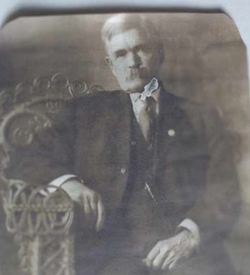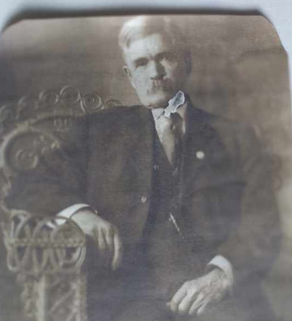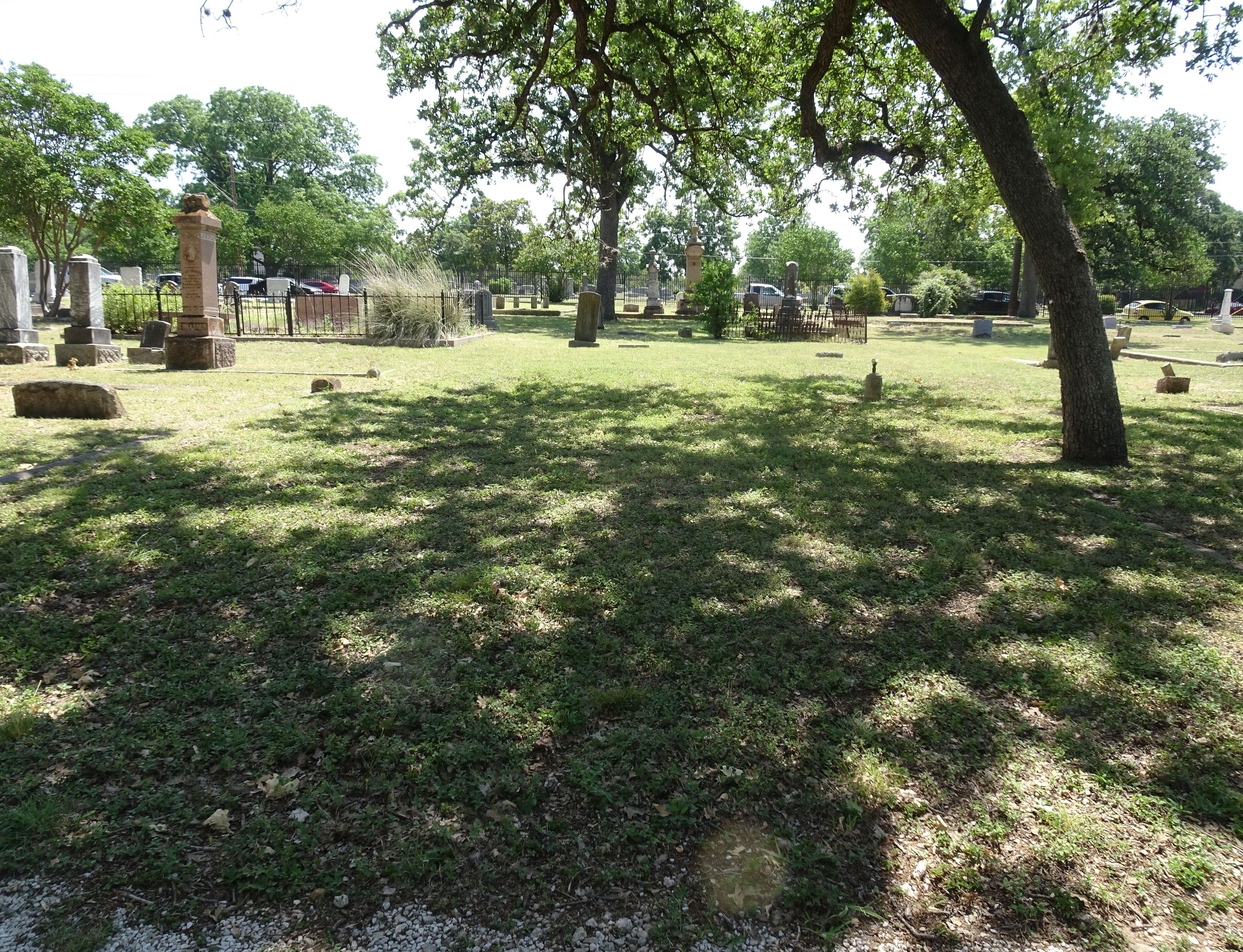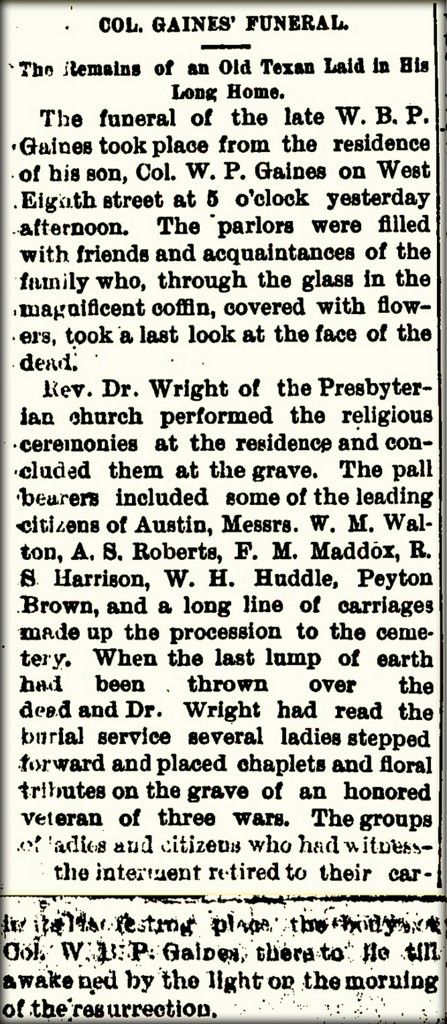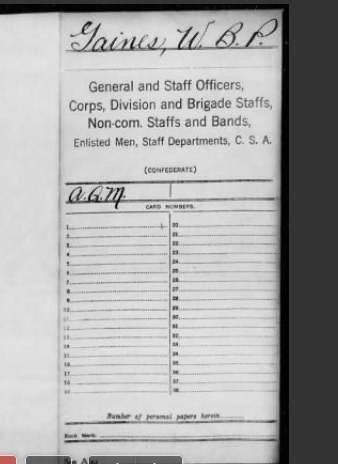first name Col. W. B. P.
last name Gains
burial date 20 May 1891
years/months/days 083 00 00
sex M
color W
disease enteritis
attending physician J. W. McLaughlin
where buried Lot 492
******
GAINES, WM. BAXTER PENDLETON
Colonel Gaines is a native of Abbeville District, South Carolina, and was born September 17, 1808. He is the son of Benjamin Pendleton Gaines, a native of Virginia, and distinguished in the war of 1812 for services as a surgeon and physician, and whose attainments in medical and surgical science being of a high order, gave him a wide celebrity, and Elizabeth Ware, also a native of Abbeville District, South Carolina, and a sister of Major N. A. Ware, of Mississippi, and at one time an extensive owner of Texas lands, well known in this State during the earlier days.
Colonel Gaines, the subject of this sketch, was reared in Abbeville and Lawrence Districts until his sixteenth year, and was trained to habits of industry and morality. In 1826, he accompanied his mother and brother, Edmond Pollard Gaines, to Mango county, Alabama, where he taught a private school for several years. In 1832, he embarked in business as a merchant, in Demopolis, Alabama. This he conducted successfully until 1835, when he accepted a proposition to go to Texas in the interest of a number of capitalists, who had invested heavily in Texas lands. He left Alabama in July, 1835, and arrived at Nacogdoches, Texas, on the 6th of August following, making the trip in a private conveyance. At Nacogdoches he met Generals Rusk, Logan, Houston, and others, to whom he had letters of introduction. Nacogdoches was made his headquarters during his operations in the interests which brought him to Texas.
In October, 1835, Texas was invaded by the Mexicans, under General Cos, and active preparations were at once begun to meet and repel the invasion. Accordingly w General Rusk, whose talent and ability were well known, and being recognized as a leading man of the times, was empowered to raise a company of one hundred men; for the purpose of equipping this command, Colonel Gaines and others furnished him liberally with money.
The destination of the troops was San Antonio, which place had already fallen into the hands of the Mexican invaders, under General Cos. Of this company, Colonel Gaines was appointed Commissary and Quartermaster. They arrived in San Antonio oil the morning after the battle of Concepcion, which occurred on the 28th of October 1835. Stephen F. Austin was present, in command of a goodly number of men; but there was a general dissatisfaction pervading the ranks, Austin, being a civilian and inexperienced in war, failed to inspire confidence in his ability as a commander. He at once offered to resign, and it was determined to reorganize the army. Pending the choice of a successor to Austin, many of the men returned to their homes, and the army was well nigh broken up. On the 28th of November, Colonel Austin sent in his resignation, and the volunteers who had remained faithful at once elected Edward Burleson to succeed him as the commander. In the mean time. Colonel Gaines had been appointed Deputy Paymaster General under General Logan, and, at the suggestion of General Rusk, returned with General Logan to Nacogdoches to prepare further for the campaign, as a long struggle with Mexico was anticipated. He accompanied General Logan from Nacogdoches to New Orleans, and after transacting important business, started on the return trip to Texas; but General Logan, falling sick on the route, stopped at Natchitoches, Louisiana, where he died. At this point, Colonel Gaines fell in with General John A. Quitman, an old friend from Natchez, Mississippi, then on his way to Texas in command of Mississippi troops, and joining him, conducted the expedition to Nacogdoches. Here they found General Mason stationed, with power from General Houston, Commander-in-Chief, to stop troops enough to protect families who were fleeing from the Mexicans and Indians. After a few days detention, they marched on, and joined General Houston a few days after the battle of San Jacinto had been fought (April 21, 1836).
Colonel Gaines was then promoted, by appointment, to the rank of Paymaster General of the Texas Army. This position he held from the 30th of May to the 3rd of August, 1836, about the close of hostilities, under General T. J. Rusk, Commander-in-Chief of the Texas army. (It will be remembered that General Houston was severely wounded at San Jacinto; after the battle, he went to New Orleans for treatment, resigning the command of the army to General Rusk.)
Upon leaving the army, General Gaines settled in Galveston, and read law under the instruction of John B. Jones and Judge Waters, and in 1840 was admitted to the bar. In 1842, having acquired a large number of negroes, he settled in Brazoria county, and engaged in cotton and sugar planting until 1868. That year he leased his plantation, and for several years engaged in buying and selling cotton at Calvert, Galveston, and other points. In September, 1872, he retired from active business, and settled in Austin, where he now resides with his son, Colonel Wm. P. Gaines.
In the war between the United States and Mexico, in 1846, he served with distinction as an officer, in Colonel Jack Hays' Regiment of Volunteers, under General Zachary Taylor, participating in several of the famous battles of that period. His gallantry during the four days fighting at Monterey attracted attention, and was recognized by Brigadier General Worth, who in commemoration thereof presented him with a handsome sword.
When his term of enlistment expired, he returned to his plantation in Brazoria county. In 1855-56 he was elected to the Legislature to represent Brazoria and Fort Bend counties in the lower house, and was recognized as one of the leading men of that session, taking an active and prominent part in all discussions and questions of legislation coming before that body.
In politics Colonel Gaines has always been a firm and consistent Democrat of the Calhoun school. The political teachings of that profound and sagacious statesman early impressed him as being eminently correct, and the principles he enunciated have ever been held by the subject of this sketch as the true exposition of what a republican government should be.
When Texas seceded from the Union on the 23d of February, 1861, and cast her lot with the Confederate States of America, Colonel Gaines, although beyond the age for military duty, tendered his services to his State, and at an election held in the counties of Brazoria and Fort Bend on the 3ist of August, 1861, he was elected Colonel of the Second regiment of the Sixteenth brigade, Texas militia; and on the 18th day of September following, was commissioned as such by Governor Edward Clark. He had great faith in the cause of the South; and not only rendered valuable personal services in the army, but contributed largely in money and cotton to the fund required for war purposes. His services, his home, his private means were all at the disposal of the Confederate cause, and were freely used. He was a large planter and slave-holder, and like all others of that class in the South, his loss by the result of the war was very great. The accumulations of years were swept away, and he was compelled to begin life anew.
In 1850 Colonel Gaines was married to Miss Eugenia Gratia Harris, of Charlotte, North Carolina, and from this marriage there were five children, to-wit: Wm. Pendleton, Celeste, Percy Orville, Aimee, and Beauregard Percy. William Pendleton is the only one of the five now living. Mrs. Gaines was a beautiful and accomplished woman, a daughter of Jonathan Harris, and a granddaughter of James Harris, a Colonel in the revolutionary war, a firm patriot, and one of the framers and signers of the Mecklenburg Declaration of Independence; and, on her mother's side, a great-granddaughter of Colonel Alexander- also a soldier of the revolution, a leading spirit in the Mecklenburg Convention, and a signer of the famous declaration. She died in December, 1867.
Colonel Gaines for forty years or more has been a consistent member of the Presbyterian church; he is a man of indomitable will and energy, and of the strictest honor and integrity; and in his character are combined all the elements of a true gentleman. (Source: Types of Successful Men of Texas, by Lewis E. Daniell, Publ. 1890.)
first name Col. W. B. P.
last name Gains
burial date 20 May 1891
years/months/days 083 00 00
sex M
color W
disease enteritis
attending physician J. W. McLaughlin
where buried Lot 492
******
GAINES, WM. BAXTER PENDLETON
Colonel Gaines is a native of Abbeville District, South Carolina, and was born September 17, 1808. He is the son of Benjamin Pendleton Gaines, a native of Virginia, and distinguished in the war of 1812 for services as a surgeon and physician, and whose attainments in medical and surgical science being of a high order, gave him a wide celebrity, and Elizabeth Ware, also a native of Abbeville District, South Carolina, and a sister of Major N. A. Ware, of Mississippi, and at one time an extensive owner of Texas lands, well known in this State during the earlier days.
Colonel Gaines, the subject of this sketch, was reared in Abbeville and Lawrence Districts until his sixteenth year, and was trained to habits of industry and morality. In 1826, he accompanied his mother and brother, Edmond Pollard Gaines, to Mango county, Alabama, where he taught a private school for several years. In 1832, he embarked in business as a merchant, in Demopolis, Alabama. This he conducted successfully until 1835, when he accepted a proposition to go to Texas in the interest of a number of capitalists, who had invested heavily in Texas lands. He left Alabama in July, 1835, and arrived at Nacogdoches, Texas, on the 6th of August following, making the trip in a private conveyance. At Nacogdoches he met Generals Rusk, Logan, Houston, and others, to whom he had letters of introduction. Nacogdoches was made his headquarters during his operations in the interests which brought him to Texas.
In October, 1835, Texas was invaded by the Mexicans, under General Cos, and active preparations were at once begun to meet and repel the invasion. Accordingly w General Rusk, whose talent and ability were well known, and being recognized as a leading man of the times, was empowered to raise a company of one hundred men; for the purpose of equipping this command, Colonel Gaines and others furnished him liberally with money.
The destination of the troops was San Antonio, which place had already fallen into the hands of the Mexican invaders, under General Cos. Of this company, Colonel Gaines was appointed Commissary and Quartermaster. They arrived in San Antonio oil the morning after the battle of Concepcion, which occurred on the 28th of October 1835. Stephen F. Austin was present, in command of a goodly number of men; but there was a general dissatisfaction pervading the ranks, Austin, being a civilian and inexperienced in war, failed to inspire confidence in his ability as a commander. He at once offered to resign, and it was determined to reorganize the army. Pending the choice of a successor to Austin, many of the men returned to their homes, and the army was well nigh broken up. On the 28th of November, Colonel Austin sent in his resignation, and the volunteers who had remained faithful at once elected Edward Burleson to succeed him as the commander. In the mean time. Colonel Gaines had been appointed Deputy Paymaster General under General Logan, and, at the suggestion of General Rusk, returned with General Logan to Nacogdoches to prepare further for the campaign, as a long struggle with Mexico was anticipated. He accompanied General Logan from Nacogdoches to New Orleans, and after transacting important business, started on the return trip to Texas; but General Logan, falling sick on the route, stopped at Natchitoches, Louisiana, where he died. At this point, Colonel Gaines fell in with General John A. Quitman, an old friend from Natchez, Mississippi, then on his way to Texas in command of Mississippi troops, and joining him, conducted the expedition to Nacogdoches. Here they found General Mason stationed, with power from General Houston, Commander-in-Chief, to stop troops enough to protect families who were fleeing from the Mexicans and Indians. After a few days detention, they marched on, and joined General Houston a few days after the battle of San Jacinto had been fought (April 21, 1836).
Colonel Gaines was then promoted, by appointment, to the rank of Paymaster General of the Texas Army. This position he held from the 30th of May to the 3rd of August, 1836, about the close of hostilities, under General T. J. Rusk, Commander-in-Chief of the Texas army. (It will be remembered that General Houston was severely wounded at San Jacinto; after the battle, he went to New Orleans for treatment, resigning the command of the army to General Rusk.)
Upon leaving the army, General Gaines settled in Galveston, and read law under the instruction of John B. Jones and Judge Waters, and in 1840 was admitted to the bar. In 1842, having acquired a large number of negroes, he settled in Brazoria county, and engaged in cotton and sugar planting until 1868. That year he leased his plantation, and for several years engaged in buying and selling cotton at Calvert, Galveston, and other points. In September, 1872, he retired from active business, and settled in Austin, where he now resides with his son, Colonel Wm. P. Gaines.
In the war between the United States and Mexico, in 1846, he served with distinction as an officer, in Colonel Jack Hays' Regiment of Volunteers, under General Zachary Taylor, participating in several of the famous battles of that period. His gallantry during the four days fighting at Monterey attracted attention, and was recognized by Brigadier General Worth, who in commemoration thereof presented him with a handsome sword.
When his term of enlistment expired, he returned to his plantation in Brazoria county. In 1855-56 he was elected to the Legislature to represent Brazoria and Fort Bend counties in the lower house, and was recognized as one of the leading men of that session, taking an active and prominent part in all discussions and questions of legislation coming before that body.
In politics Colonel Gaines has always been a firm and consistent Democrat of the Calhoun school. The political teachings of that profound and sagacious statesman early impressed him as being eminently correct, and the principles he enunciated have ever been held by the subject of this sketch as the true exposition of what a republican government should be.
When Texas seceded from the Union on the 23d of February, 1861, and cast her lot with the Confederate States of America, Colonel Gaines, although beyond the age for military duty, tendered his services to his State, and at an election held in the counties of Brazoria and Fort Bend on the 3ist of August, 1861, he was elected Colonel of the Second regiment of the Sixteenth brigade, Texas militia; and on the 18th day of September following, was commissioned as such by Governor Edward Clark. He had great faith in the cause of the South; and not only rendered valuable personal services in the army, but contributed largely in money and cotton to the fund required for war purposes. His services, his home, his private means were all at the disposal of the Confederate cause, and were freely used. He was a large planter and slave-holder, and like all others of that class in the South, his loss by the result of the war was very great. The accumulations of years were swept away, and he was compelled to begin life anew.
In 1850 Colonel Gaines was married to Miss Eugenia Gratia Harris, of Charlotte, North Carolina, and from this marriage there were five children, to-wit: Wm. Pendleton, Celeste, Percy Orville, Aimee, and Beauregard Percy. William Pendleton is the only one of the five now living. Mrs. Gaines was a beautiful and accomplished woman, a daughter of Jonathan Harris, and a granddaughter of James Harris, a Colonel in the revolutionary war, a firm patriot, and one of the framers and signers of the Mecklenburg Declaration of Independence; and, on her mother's side, a great-granddaughter of Colonel Alexander- also a soldier of the revolution, a leading spirit in the Mecklenburg Convention, and a signer of the famous declaration. She died in December, 1867.
Colonel Gaines for forty years or more has been a consistent member of the Presbyterian church; he is a man of indomitable will and energy, and of the strictest honor and integrity; and in his character are combined all the elements of a true gentleman. (Source: Types of Successful Men of Texas, by Lewis E. Daniell, Publ. 1890.)
Family Members
Advertisement
Explore more
Sponsored by Ancestry
Advertisement
